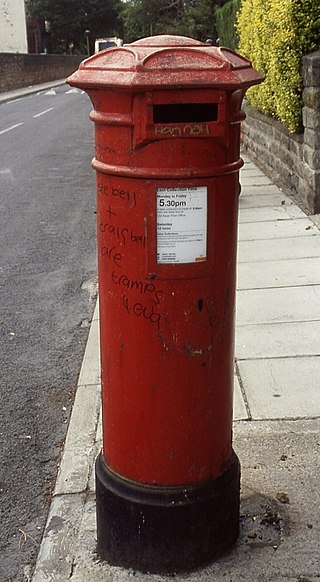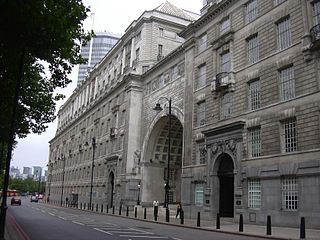Related Research Articles

Carlill v Carbolic Smoke Ball Company[1893] 1 QB 256 is an English contract law decision by the Court of Appeal, which held an advertisement containing certain terms to get a reward constituted a binding unilateral offer that could be accepted by anyone who performed its terms. It is notable for its treatment of contract and of puffery in advertising, for its curious subject matter associated with medical quackery, and how the influential judges developed the law in inventive ways. Carlill is frequently discussed as an introductory contract case, and may often be the first legal case a law student studies in the law of contract.
The posting rule is an exception to the general rule of contract law in common law countries that acceptance of an offer takes place when communicated. Under the posting rule, that acceptance takes effect when a letter is posted ; the post office will be the universal service provider, such as the UK's Royal Mail, the Australia Post, or the United States Postal Service. In plain English, the "meeting of the minds" necessary to contract formation occurs at the exact moment word of acceptance is sent via post by the person accepting it, rather than when that acceptance is received by the person who offered the contract.
Offer and acceptance are generally recognized as essential requirements for the formation of a contract. Analysis of their operation is a traditional approach in contract law. This classical approach to contract formation has been modified by developments in the law of estoppel, misleading conduct, misrepresentation, unjust enrichment, and power of acceptance.

Felthouse v Bindley [1862] EWHC CP J35, is the leading English contract law case on the rule that one cannot impose an obligation on another to reject one's offer. This is sometimes misleadingly expressed as a rule that "silence cannot amount to acceptance".
Pharmaceutical Society of Great Britain v Boots Cash Chemists (Southern) Ltd [1953] EWCA Civ 6 is a famous English contract law decision on the nature of an offer. The Court held that the display of a product in a store with a price attached is not sufficient to be considered an offer, and upheld the concept of an invitation to treat.

Smith v Hughes (1871) LR 6 QB 597 is an English contract law case. In it, Blackburn J set out his classic statement of the objective interpretation of people's conduct when entering into a contract. The case regarded a mistake made by Mr. Hughes, a horse trainer, who bought a quantity of oats that were the same as a sample he had been shown. However, Hughes had misidentified the kind of oats: his horse could not eat them, and he refused to pay for them. Smith, the oat supplier, sued for Hughes to complete the sale as agreed. The court sided with Smith, as he provided the oats Hughes agreed to buy. That Hughes made a mistake was his own fault, as he had not been misled by Smith. Since Smith had made no fault, there was no mutual mistake, and the sale contract was still valid.

Butler Machine Tool Co Ltd v Ex-Cell-O Corp (England) Ltd [1977] EWCA Civ 9 is a leading English contract law case. It concerns the problem found among some large businesses, with each side attempting to get their preferred standard form agreements to be the basis for a contract.

Adams v Lindsell(1818) 1 B & Ald 681, is an English contract case regarded as the first case towards the establishment of the "postal rule" for acceptance of an offer. Ordinarily, any form of acceptance must be communicated expressly to an offeror; however, it was found that where a letter of acceptance is posted, an offer is accepted "in course of post".
Harvey v Facey [1893], is a contract law case decided by the United Kingdom Judicial Committee of the Privy Council on appeal from the Supreme Court of Judicature of Jamaica. In 1893 the Privy Council held final legal jurisdiction over most of the British Caribbean n. Its importance in case law is that it defined the difference between an offer and supply of information. The Privy Council held that indication of lowest acceptable price does not constitute an offer to sell. Rather, it is considered a response to a request for information, specifically a "precise answer to a precise question" about the lowest acceptable price which the seller would consider.

In English contract law, an agreement establishes the first stage in the existence of a contract. The three main elements of contractual formation are whether there is (1) offer and acceptance (agreement) (2) consideration (3) an intention to be legally bound.

Daulia Ltd v Four Millbank Nominees Ltd [1977] is an English contract law case, concerning unilateral contracts, and when embarking on the performance of an act for which an offer is open, at what point the offer may be withdrawn. In particular, Goff LJ observed that there would be a duty to not prevent full performance of terms in a unilateral offer, once performance had begun.

Lefkowitz v. Great Minneapolis Surplus Store, Inc 86 NW 2d 689 is an American contract law case. It concerns the distinction between an offer and an invitation to offer. The case held that a clear, definite, explicit and non-negotiable advertisement constitutes an offer, acceptance of which creates a binding contract. Furthermore, it held that an advertisement which did not clarify the terms of its bargains, such as with fine print, could not then be modified with arbitrary house rules.
Contract law regulates the obligations established by agreement, whether express or implied, between private parties in the United States. The law of contracts varies from state to state; there is nationwide federal contract law in certain areas, such as contracts entered into pursuant to Federal Reclamation Law.

Byrne & Co v Leon Van Tien Hoven & Co [1880] 5 CPD 344 is a leading English contract law case on the issue of revocation in relation to the postal rule. In it Lindley J of the High Court's Common Pleas Division ruled that an offer is only revoked by direct communication with the offeree, and that the postal rule does not apply in revocation; while simply posting a letter counts as a valid acceptance, it does not count as valid revocation.

Sumpter v Hedges [1898] 1 QB 673 is an English contract law case concerning substantial performance of a contract and restitution for unjust enrichment.
Hyde v Wrench [1840] EWHC Ch J90 is a leading English contract law case on the issue of counter-offers and their relation to initial offers. It contains Lord Langdale's ruling that any counter-offer cancels the original offer.

Blackpool & Fylde Aero Club v Blackpool Borough Council [1990] EWCA Civ 13 is a leading English contract law case on the issue of offer and acceptance in relation to an invitation to tender. In it the Court of Appeal of England and Wales decided that tenders and requests for tenders are accompanied by a collateral contract implying that the requestor will give due consideration to any timely bid.

Chysky v. Drake Bros. Co., 235 N.Y. 468, 139 N.E. 576 (1922), was a products liability case before the New York Court of Appeals. The Court held that a plaintiff cannot recover from a defendant based on implied warranty when she does not have contractual privity with him; thus, a plaintiff cannot recover from a defendant who sold her employer food unfit for consumption, because the defendant's implied warranty extended only to the employer.

Dickinson v Dodds (1876) 2 Ch D 463 is an English contract law case heard by the Court of Appeal, Chancery Division, which held that notification by a third party of an offer's withdrawal is effective just like a withdrawal by the person who made an offer. The significance of this case to many students of contract law is that a promise to keep an offer open is itself a contract which must have some consideration.
Power of acceptance is a concept of contract law. It refers to the power vested in the offeree by the offeror through the offer being made. It is used to determine whether the acceptance of an offer is valid.
References
- ↑ Beatson, Jack; Burrows, Andrew; Cartwright, John (2020). Anson's Law of Contract (31st ed.). Oxford, United Kingdom: Oxford University Press. pp. 42–43. ISBN 978-0-19-882997-3.